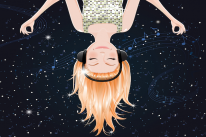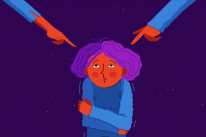
“Rock bottom became the solid foundation on which I built my life.” ~J.K. Rowling
Most people who know me will say I am incredibly kind, loving, and empathetic. They know me as a safe person that they can share anything with and that I won’t judge. What they may not know is I am incredibly judgmental and unkind to myself.
When it comes to others, I see light and love. I see confusion and fear behind their misguided actions. I see mistakes as learning opportunities. For myself, I used to see…if I dare say it, a stupid girl who should know better and do better and be better.
That felt mean even to write. It is an odd combination to love and accept others so deeply but to not love myself in the same way. Sometimes I wonder if my ability to truly see others’ greatness, potential, and beauty is linked to the fact that I didn’t see my own—like perhaps I put all my energy into valuing others instead of directing some of it toward myself.
I’ve always wished I could treat myself with the same love I’ve extended to others, but instead, I set myself a different set of standards—ones that cannot be reached because they’re unrealistic. The path of no mistakes, no pain, and no suffering. The path where everything works out according to plan. My plan was always simple: try to do the right thing and follow the rules so I can stay in control.
So that’s what I did—played it safe and small in many life areas to avoid mistakes, conflict, and my own harsh judgment.
With friends, I kept quiet when I had different opinions. In romance, I tried to be easy and straightforward. At work, I took the most cautious route, determined to prove my worth before reaching for more. I did it “the right way”—thoughtful, careful, and safe.
So everything worked out according to plan, right? Wrong—that is not what happened. Because life never goes “to plan” for any of us.
Case in point: When a discussion with one of my closest friends ended in a disagreement, I felt a stab in my heart that led to a free fall of tears. It wasn’t the disagreement that hurt but the realization that I wasn’t being my true self with her and that, perhaps, she didn’t accept my true self.
This brought up feelings of abandonment. Was it safe to have a different opinion? Would I be pushed aside, or could I share what I believed to be true and still be loved?
I now know the pain I felt after her abandonment wasn’t just about our friendship ending; it was about all the times I’d abandoned myself. The times when I’d chosen someone else’s approval over my own and blamed myself when things didn’t work out instead of accepting that pain is inevitable in life—and it doesn’t mean I’m doing anything wrong.
When my dream job went to someone else, I felt the sting of rejection and replayed everything I might have said or done wrong. I thought of all the reasons I wasn’t qualified and didn’t belong. Being such a harsh judge, I could see all the reasons they hadn’t chosen me, but not the reasons I was still worth choosing. Before I knew it, I agreed with their choice.
I chose to put other people’s feelings first—empathetically considering their perspective without considering my own.
This realization hit me hard during a therapy session. I was speaking about a time growing up when my family had to suddenly move and how hard this was for everyone, but I struggled to express how hard it was for me, quickly transitioning to the bigger picture.
I realized then that I needed to slow down and reflect on my own experiences and feelings in order to show myself the same compassion I so easily extended to others. It was no longer one or the other but both, and this wasn’t easy because it meant I had to sit with the pain of being my true self instead of covering it up.
I’d always blamed myself for everything that had gone wrong in my life because it gave me a sense of control. If I was the problem, I didn’t have to sit with the pain of life’s unpredictability.
In truth, I hated parts of myself and didn’t know why until recently. The quality I most despised was my insecurity. It led me to over-analyze my choices and compare myself to others instead of celebrating my own accomplishments. For example, when I was invited to teach a class in college, I turned it down, pretending to be sick, because I didn’t believe I was good enough.
Many of my struggles stemmed from my sensitive and creative nature. I was a sponge, soaking up every detail, seeing things from all perspectives. This gave me the gift to empathize and support others on a deep level, but it also led to overthinking and self-recrimination.
For example, in my twenties, I stayed in a relationship that didn’t feel right because I was scared and unsure of myself. When it ended badly, I blamed myself for not knowing better instead of recognizing that I couldn’t have known until I learned through experience.
The inability to love my true, whole self—including my faults and past experiences—was at its core an unwillingness to accept pain. It stunted my growth and led to suffering. It kept me small and stuck in repeating negative cycles of overthinking, comparison, and insecurity.
In therapy, in coaching groups, and in my writing, I began sharing the stories I’d once hidden in shame, and my inner hatred slowly disappeared.
I shared the many times I was confused about my own emotions and struggled to be kind to myself. With time, I began to see my own mistakes from a different lens—as the witness of my younger self rather than the judge. I felt different—like a closed door in my heart opened.
I was finally able to have compassion for myself when I started seeing myself as deserving of love and allowed to make mistakes—when I allowed myself to be human just like everyone else. I also began to understand that not everything that goes wrong is my fault, and I don’t have to beat myself up just because things don’t go “to plan.”
My friend shared a metaphor about turning a big rock upside down and how, underneath that rock, you’d find darkness, mud, and bugs scurrying around as they are exposed from their hiding place. That’s exactly what it feels like to me. Every time I share honestly and expose my heart, my fears, and the things I am ashamed of, I am left with the warm sun shining down, and those little pesky bugs disappearing.
I now know that I deserve love too, even though I am imperfect. I am still worthy—but I have to believe it. It took a lot of tears to get there. A lot of embarrassment and confusion. A lot of willingness and courage.
Reflecting on this reminded me of my strength and capacity to overcome hardships. Then another powerful realization occurred to me—I am powerful enough to get through any storm, and I wouldn’t trade this particular storm for anything in the world.
I wouldn’t trade the pain, the hardship, or the dark nights of learning to embrace myself for the perfect plan I originally wanted—because this is what connects our hearts to each other, and that means more to me than anything.
Recently, I received an email from a reader saying, “Thank you, and keep writing.” I sat in silence and cried.
I have always dreamed of someone saying that to me, but this time it was different. It was like I truly felt it in my heart. In that moment, I believed my words had value. I believed that I have value. My own heart finally had room for me too.
About Orly Levy
Orly Levy is an Intuitive Life Coach and Writer. She offers guidance for the sensitive soul struggling to see their gifts. Through her one-on-one programs, she leads others to meet with "what is" to release blockages, reconnect with their intuition, and discover true peace. Visit her virtual home for tools, to schedule a free session, and follow her on Instagram.












 Though I run this site, it is not mine. It's ours. It's not about me. It's about us. Your stories and your wisdom are just as meaningful as mine.
Though I run this site, it is not mine. It's ours. It's not about me. It's about us. Your stories and your wisdom are just as meaningful as mine.
Orly,
I was in the same situation as you years ago. It's taken me a long time to speak up for myself. Keep going.
This article resonated with me deeply. It felt like a mirror to my soul. Thank you for sharing your reflections and giving me the opportunity to reflect myself.
Hi there! I'm a huge fan of Tiny Buddha's posts (I get the emails); I deal with self-hatred, bipolar, burnout, and impostor syndrome a lot, and these are super empowering. This post is no exception, you wrote something really helpful here and I greatly appreciate it! It's always especially lovely seeing you and others being so open and honest about yourself, your experiences, etc.
However, I wanted to ask a favor, and that's to please not use quotes from JK Rowling in posts. She's a massive source of hatred toward transgender people, actively pushing to make us cease to exist, to remove us from public spaces, to make our lives so painful to live that we either detransition or never feel safe again. It made it very hard for me to start reading this, as seeing a quote from someone who wishes I was dead, followed by saying you're empathetic and a safe person, are very contradictory.
I'm not blaming anyone. I totally believe everything you wrote. A lot of people don't know just how bad JK Rowling is against trans people, and I understand that Harry Potter is a magnificent creation. But that doesn't excuse her from being the hateful person she is, or make me feel like I'm not excluded.
Thanks, and great piece here! 🧡
Thank you. It's nice to know I'm not the only one who felt the same way.
Hi Orly
Beautiful. I felt this is me when I was reading through. "I am allowed to make mistakes" ❤️ thank you !